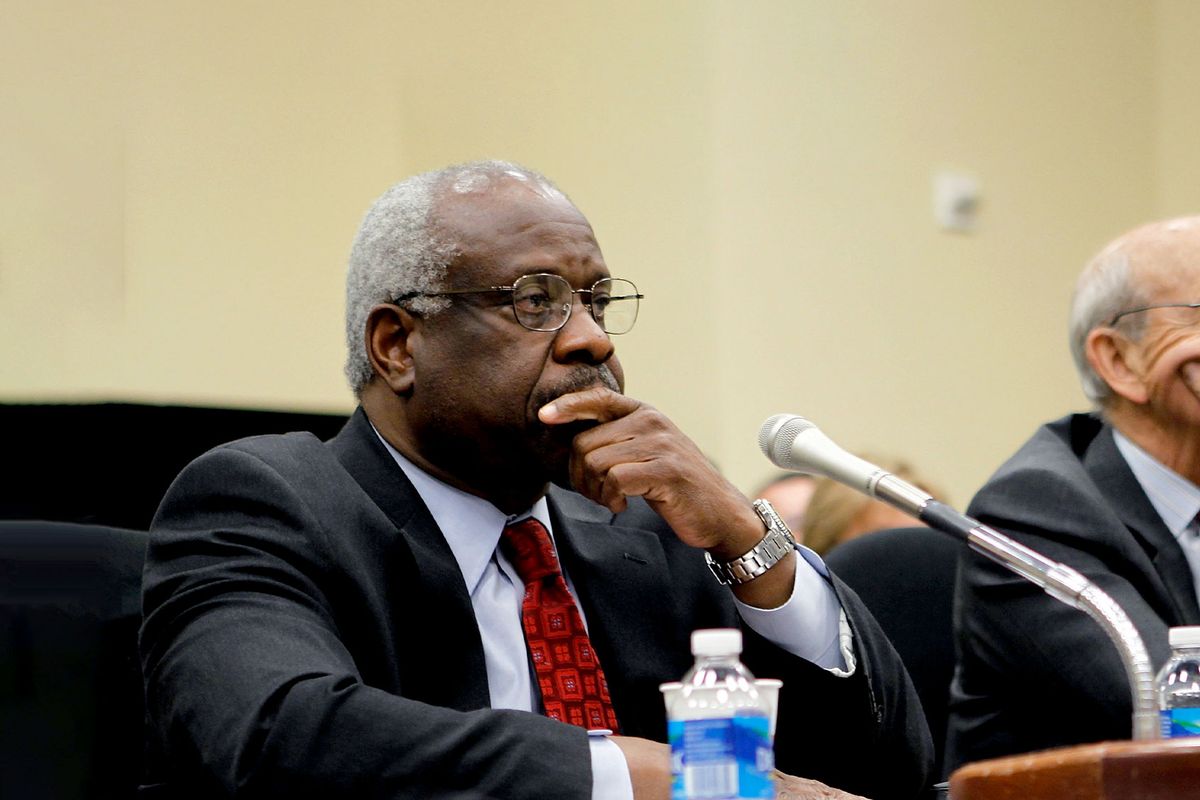A Justice Department probe of Supreme Court Justice Clarence Thomas could uncover whether the justice knowingly and willfully filed false financial disclosure statements or failed to pay taxes on luxury gifts — despite Attorney General Merrick Garland's likely lack of political will to launch an investigation months before the November election, legal experts told Salon.
Sens. Sheldon Whitehouse, D-R.I., and Ron Wyden, D-Ore., earlier this week asked Garland to appoint a special counsel to determine whether Thomas violated several laws in his failure to disclose a forgiven loan and gifts he received from wealthy benefactors.
The Senate Finance Committee found that Thomas failed to disclose a forgiven loan of $267,230 that he used to purchase a luxury motorcoach.
"The question is, when you look at this, is there at least a reason to suspect that there was intentional failure to disclose gifts that the Justice was obligated to disclose?" Fordham School of Law professor Bruce Green said. "There's obviously, you know, not a basis to indict him. There's a basis to investigate."
Thomas's attorney — who told senators that "the terms of the agreement were satisfied" when asked about the forgiven loan — and the Department of Justice did not immediately respond to requests for comment Thursday.
Green said he expects Garland will at least take Sens. Whitehouse and Wyden's request seriously.
"But my guess is that at the end of the day, that Attorney General Garland will not appoint a special counsel to investigate before the election," Green said. "We're very close to an election where the Justice Department has been accused already of weaponizing criminal prosecution."
Green said even if Garland launched an investigation now, it's highly unlikely it would be completed before the election.
And if Trump wins, he'd likely shutter any probe.
We need your help to stay independent
New York University School of Law professor Stephen Gillers said there's still reason for Garland to launch an investigation.
"It's a bold move by the senators to request this," Gillers said. "But it's a perfectly plausible request, because there is sufficient evidence."
And Gillers said a special counsel would be appropriate to provide independent oversight.
"The reason for having a special counsel in a situation like this is that special counsel has greater insulation from greater independence than a line prosecutor," he said. "And the Attorney General might conclude that it would be awkward at best to have the solicitor general arguing before the Supreme Court, with Justice Thomas on it, while another member of the same department of justice is investigating Thomas for possible criminal behavior."
Want a daily wrap-up of all the news and commentary Salon has to offer? Subscribe to our morning newsletter, Crash Course.
Gillers said for Thomas to ever face potential penalties, prosecutors would need evidence that any falsification of financial disclosure statements was "not a mistake."
"The special counsel, if one were appointed, would have to decide whether or not falsification of financial statements were a product of willfulness with knowledge," Gillers said.
Gillers said knowingly submitting a false statement to federal officials like a financial disclosure statement is itself another crime.
Gillers said a special counsel could probe the potential tax implications of any gifts Thomas has received over the years from benefactors, including real estate tycoon Harlan Crow.
"The many gifts that Thomas received — and it's not just from Harlan Crow — over the years, those gifts carry tax implications, yet the taxes were not paid," Gillers said. "Now, one of the questions is, well, whose job was it to pay the taxes? The donor or the justice? And that would have to be investigated also."
Thomas' defenders include Ilya Shapiro, a senior fellow and director of constitutional studies at the Manhattan Institute.
Shapiro said that Thomas has complied with Supreme Court ethics rules, and said criticism about Thomas' reporting of gifts stems from a "left-wing dark-money smear campaign."
When asked specifically about concerns over Thomas' disclosure of gifts, Shapiro said: "There’s no ethical problem with getting gifts from friends who have no business before the court."
Still, the progressive advocacy group Accountable.US has found that trade groups related to Crow have filed amicus briefs on matters before the Supreme Court.
Read more
about this topic



Shares